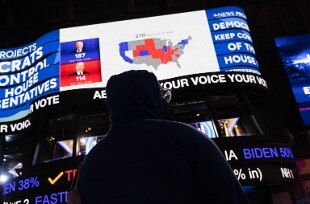Share
November 04, 2020If Donald Trump's victory over Hillary Clinton in 2016 had slapped the credibility of pollsters in the face, the incumbent president's recovery against challenger Joe Biden almost looks like a coup de grace.
The advantage that the major institutions had given to the former first lady on the eve of the vote 4 years ago, after all, fell in several cases in the famous margin of error of 3 or 4 points.
Far more sensational is the distance between the advantage of 7, 10, even 12 points that still a week ago many survey companies assigned to Biden and the actual numbers today, with Trump down by less than 2% in the popular vote.
"The profession of political polling is over," said Frank Luntz, a Republican veteran of the industry with Axios.
A declaration of surrender that comes after weeks of heated debate among insiders, most of whom raged against the few colleagues who accused them of underestimating the consensus for Trump, swearing that this time the advantage of Biden was really too huge. in order to appear as a new blunder.
At the center of the discussion there is always him, the "shy Trump voter", the one who in public is ashamed to admit his not very chic predilection for the tycoon and then vent it in the secret of the urn.
This elusive category of voters had been the main reason for the colossal crab caught by pollsters in 2016.
Robert Cahaly of Trafalgar Group, the only company that hit Trump's lead four years ago in Michigan and Pennsylvania, a few days ago told " The Hill "that this time the" shy Trumpists "would be even more and that a new defeat was" quite probable "for his industry.
Words that had been greeted with disdain by the big names in the industry, such as Nate Silver of FiveThirtyEight, who had accused his colleague of "not knowing what he was doing".
"Trafalgar keeps his methods secret so I can't judge what they do," said North Star Opinion Republican pollster Jon McHenry.
Yet Cahaly wasn't the only one predicting Trump's comeback.
Another voice out of the chorus was that of Jim Lee of Susquehanna Polling and Research, another proponent of the "shy Trump voter" theory.
Lee was able to guess both Trump's victory in Florida and the extremely uncertain situation in Wisconsin, where he had given the two contenders almost equal.
His predictions turned out to be more reliable than both Trafalgar's "black sheep," who had given the outgoing president one point above in Badger State, and FiveThirtyEight stars, who said Trump was two points down in Florida.
"There are a lot of voters who don't want to admit they are voting for a guy who has been described as a racist," Lee said last week in an interview with Wfmz, "this 'underground Trumpism' is very concrete, we have managed to capture him and I am very disappointed that the others have not been able to. "
The numbers proved him right.
Interesting signs then came from the curious experiment at the University of Southern California's Dornsife Center, which asked respondents not only who would vote but also which candidate would prevail in their social circle and who they thought would win in their state.
The answers to the first question gave Biden an 11% advantage, those to the second a 5% advantage, and those to the third saw Trump behind by just one percentage point.
In essence, the most accurate prediction was not obtained by asking voters what they would vote but by asking them what their fellow citizens would choose.
The beginning of a new way for a polling industry forced to rethink the roots?
We'll find out in four years.

